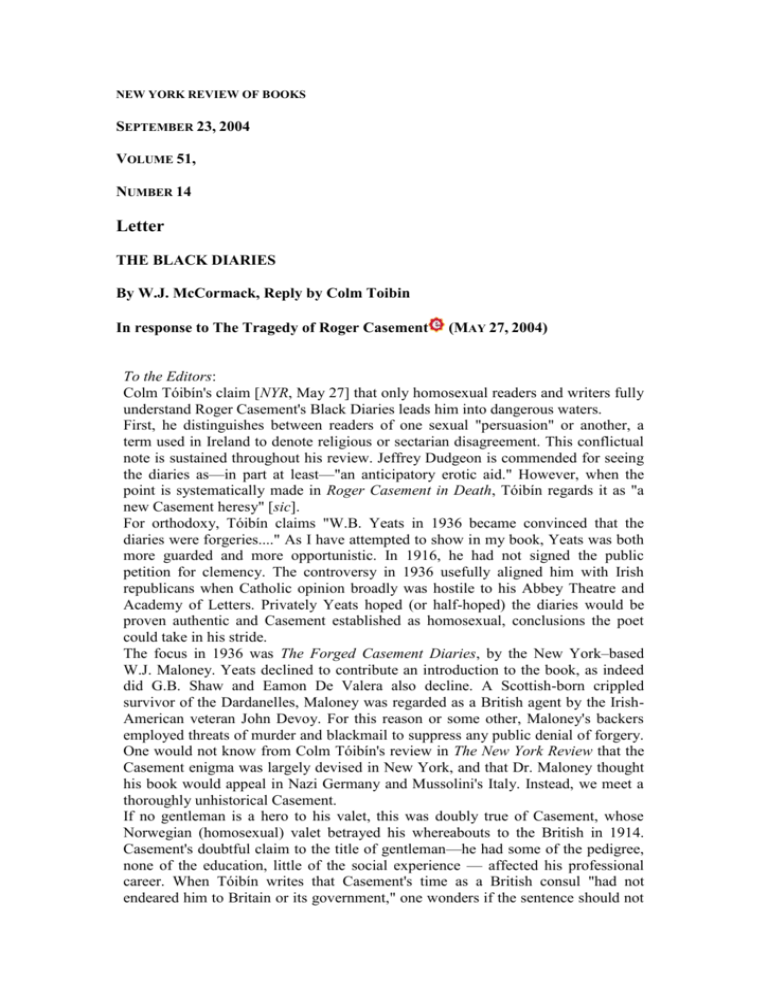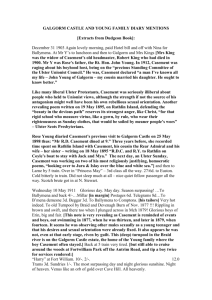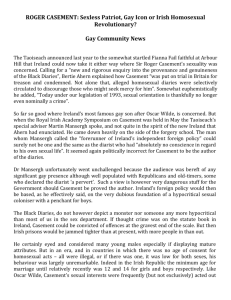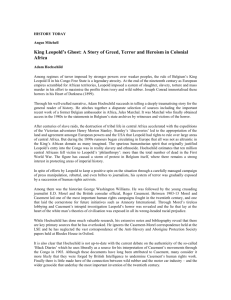
NEW YORK REVIEW OF BOOKS
SEPTEMBER 23, 2004
VOLUME 51,
NUMBER 14
Letter
THE BLACK DIARIES
By W.J. McCormack, Reply by Colm Toibin
In response to The Tragedy of Roger Casement
(MAY 27, 2004)
To the Editors:
Colm Tóibín's claim [NYR, May 27] that only homosexual readers and writers fully
understand Roger Casement's Black Diaries leads him into dangerous waters.
First, he distinguishes between readers of one sexual "persuasion" or another, a
term used in Ireland to denote religious or sectarian disagreement. This conflictual
note is sustained throughout his review. Jeffrey Dudgeon is commended for seeing
the diaries as—in part at least—"an anticipatory erotic aid." However, when the
point is systematically made in Roger Casement in Death, Tóibín regards it as "a
new Casement heresy" [sic].
For orthodoxy, Tóibín claims "W.B. Yeats in 1936 became convinced that the
diaries were forgeries...." As I have attempted to show in my book, Yeats was both
more guarded and more opportunistic. In 1916, he had not signed the public
petition for clemency. The controversy in 1936 usefully aligned him with Irish
republicans when Catholic opinion broadly was hostile to his Abbey Theatre and
Academy of Letters. Privately Yeats hoped (or half-hoped) the diaries would be
proven authentic and Casement established as homosexual, conclusions the poet
could take in his stride.
The focus in 1936 was The Forged Casement Diaries, by the New York–based
W.J. Maloney. Yeats declined to contribute an introduction to the book, as indeed
did G.B. Shaw and Eamon De Valera also decline. A Scottish-born crippled
survivor of the Dardanelles, Maloney was regarded as a British agent by the IrishAmerican veteran John Devoy. For this reason or some other, Maloney's backers
employed threats of murder and blackmail to suppress any public denial of forgery.
One would not know from Colm Tóibín's review in The New York Review that the
Casement enigma was largely devised in New York, and that Dr. Maloney thought
his book would appeal in Nazi Germany and Mussolini's Italy. Instead, we meet a
thoroughly unhistorical Casement.
If no gentleman is a hero to his valet, this was doubly true of Casement, whose
Norwegian (homosexual) valet betrayed his whereabouts to the British in 1914.
Casement's doubtful claim to the title of gentleman—he had some of the pedigree,
none of the education, little of the social experience — affected his professional
career. When Tóibín writes that Casement's time as a British consul "had not
endeared him to Britain or its government," one wonders if the sentence should not
be turned on its head. For Casement's heart-of-darkness years did not endear
Britain to him as he observed the woeful effects of colonialism; this disillusion fed
his latent Irish nationalism. Tóibín's preferred reading generates a preordained
victim, rather than the actual and naturally limited resister.
Similar problems affect the claim that "Casement was personally [sic] responsible
for the decision of the Foreign Office in London to take diplomatic action, at times
faltering...against Belgian cruelty in the Congo." Inside the Foreign Office,
Casement possessed no such authority, nor could he personally (as distinct from
professionally) have achieved this effect. He played an important part in the
coalition of lobbyists and protesters, outside and inside the British Establishment.
But only a part.
Confusion of the part with the whole is central to Tóibín's mode of argument. Thus,
Dudgeon's edition of Casement's diaries is "perhaps the most complete and
interesting so far," though Dudgeon frankly describes the texts as abridged. What
has been omitted is essentially the non(homo)- sexual material. That is to say, much
that is political and personal (but nonsexual) is gone, so as to get the controversial
stuff into print. Nobody could quarrel with that declared selectivity in itself. And
(as Tóibín acknowledges) Dudgeon's commentary is invaluable. But if "the
abridged" is happily taken as "the most complete," where do we stand as editors, as
upholders of the scrupulous and tolerant understanding of texts?
Tóibín's preference for an exclusively (homo)sexual hero lies parallel with that of
the Dublin-based Roger Casement Foundation who want an exclusively political
one. Tóibín's view is by far the more sophisticated, but there is more common
ground than either can find comfortable. If it were acceptable that heterosexuals can
contribute to an understanding of documents written by Casement, then at least
those parallel lines would run in opposite directions. The benefits may interest the
historian more than the novelist, but they are worth seeking at this time of heroic
crusader politics and massively distorted rhetoric.
W.J. McCormack
University College Dublin Press
Dublin, Republic of Ireland
Colm Tóibín replies:
W.J. McCormack is mistaken when he writes that I claim that only homosexual
readers and writers can fully understand Roger Casement's Black Diaries. In my
review I specifically commended the work of the two editors of the 1903 Diaries,
who happened to be heterosexual. Their work, I wrote, was judicious and
meticulous.
There is a great difference between Jeffrey Dudgeon's assertion that some of the
diary entries were "anticipatory erotic aids," which I take to mean that they
anticipated events which Casement genuinely believed were going to happen, and
McCormack's view that some of the diary entries were invented. The second of
these I believe is a heresy (and I use the word lightly). McCormack, however, like
many heretics before him, may even turn out to be right. It is hard to be certain.
I do not agree that the Casement enigma "was largely devised in New
York." McCormack's book focuses mainly on W.J. Maloney and the events of
1936, twenty years after Casement's execution. While this is interesting, much of it
seemed to me quite peripheral to the essential story of Casement and his legacy.
I stated that Jeffrey Dudgeon's edition of the Casement diaries is "perhaps the most
complete and interesting so far" for an obvious reason. It is the only book which
includes any of the 1911 Diaries. It also has extracts from the other diaries as well.
No other single volume contains this range of material.
McCormack's statement that I have a preference for an exclusively (homo)sexual
hero is also mistaken. My review dealt at some length with Casement's work as a
humanitarian in the Congo and the Amazon. McCormack himself acknowledges
this in his argument with me about whether the impulse was personal or
professional. In writing about Casement's work for human rights, it is often difficult
to disentangle the two.
Toibin article extract 7 MAY 2004-09-16
VOLUME 51, NUMBER 9
Review
The Tragedy of Roger Casement
By Colm Toibin
Roger Casement: The Black Diaries
by Jeffrey Dudgeon
Belfast: Belfast Press, 659 pp., £25.00
Sir Roger Casement's Heart of Darkness: The 1911 Documents
by Angus Mitchell
Dublin: Irish Manuscripts Commission, 816 pp., £75.00
The Eyes of Another Race: Roger Casement's Congo Report and 1903 Diary
edited by Séamus Ó Síocháin and Michael O'Sullivan
Dublin: University College Dublin Press, 366 pp., $74.95; $34.95 (paper)
Roger Casement in Death, or Haunting the Free State
by W.J. McCormack
Dublin: University College Dublin Press, 240
(paper)(distributed in the US by Dufour Editions)
pp.,
$54.95;
$27.95
In The Rings of Saturn W.G. Sebald finds himself in an English seaside town
falling asleep during a BBC documentary about the life of the Irishman Roger
Casement, who was executed by the British in August 1916 for high treason.
Afterward, when Sebald, intrigued by his own vague and twilit memories of the
program, sets about finding out what he can about Casement, his imagination is
fired by the relationship between Casement and Joseph Conrad, who first met each
other in the Congo in either 1889 or 1890, when Casement, then in his midtwenties, was working for the Congo Railway Company. For a number of weeks
the two men shared a room. Conrad found inspiration at that time for Heart of
Darkness; Casement was beginning on the road toward becoming a hero, a martyr,
and a traitor.
On Casement, Conrad wrote that “the work he was busy about then was recruiting
labour. He knew the coast languages well. I went with him several times on short
expeditions to hold ‘palavers’ with neighbouring village-chiefs.” Later, in 1904, when
Casement had become impassioned about atrocities being committed in the Congo
and had written a report for the British government on the matter, he went to see
Conrad. Jessie Conrad, the novelist’s wife, remembered his visit:
Sir Roger Casement, a fanatical Irish protestant, came to see us, remaining some two
days our guest. He was a very handsome man with a thick dark beard and piercing,
restless eyes. His personality impressed me greatly. It was about the time when he
was interested in bringing to light certain atrocities which were taking place in the
Belgian Congo. Who could foresee his own terrible fate during the war as he stood in
our drawing-room passionately denouncing the cruelties he had seen?
Conrad had already written to Casement when Heart of Darkness was published: “I
am glad you read the Heart of D., tho’ of course it’s an awful fudge.” At the time of
Casement’s report on the Congo, Conrad also wrote to his friend R.B. Cunninghame
Graham:
He’s a protestant Irishman, pious too. But so was Pizzaro. For the rest I can assure
you that he is a limpid personality. There is a touch of the Conquistador in him too;
for I have seen him start off into an unspeakable wilderness swinging a crookhandled
stick for all weapons, with two bulldogs, Paddy (white) and Biddy (brindle) at his
heels and a Loanda boy carrying a bundle for all company. A few months afterwards
it so happened that I saw him come out again, a little leaner a little browner, with his
stick, dogs, and Loanda boy, and quietly serene as though he had been for a stroll in a
park…. I would help him but it is not in me…. I am only a wretched novelist
inventing wretched stories, and not even up to that miserable game…. He could tell
you things! Things I have tried to forget, things
6091 words
*PRO Home Office 144/1636





